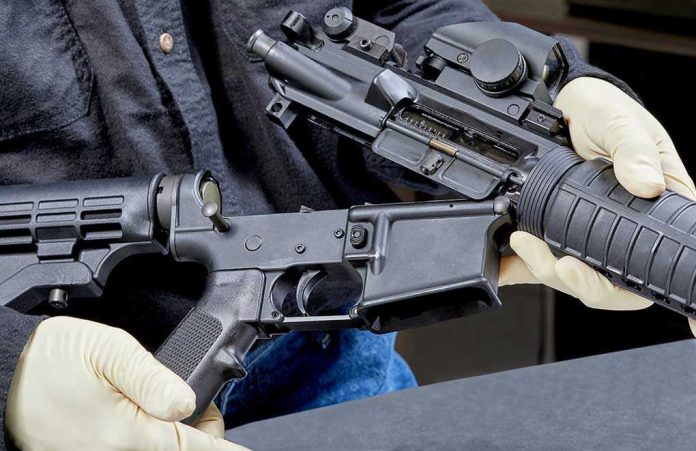
Washington politicians finally did something that makes sense for once—ending the federal firearm tax that’s been fleecing law-abiding Americans for nearly a century, leaving gun rights advocates both triumphant and ready for the next battle over our constitutional freedoms.
At a Glance
- The One Big Beautiful Bill Act eliminates the $200 federal tax on suppressors, short-barreled rifles, and shotguns starting January 2026.
- Major gun rights groups call the law a historic win against outdated and unconstitutional gun regulations.
- Registration and background check requirements remain, setting the stage for new court challenges to further dismantle federal overreach.
- Firearms industry expects a surge in sales as the financial barrier to lawful ownership collapses.
A Century of Nonsense Finally Faces a Reckoning
For almost a hundred years, bureaucrats have clung to the National Firearms Act’s $200 transfer tax—a relic originally meant to crush the Second Amendment under the guise of public safety. The tax, set in 1934 to a sum equivalent to nearly $5,000 today, was never about “safety.” It was about pricing working Americans out of their own rights. Only in Washington could such a scheme survive this long: a tax on freedom, designed by people who barely trust their own voters with a butter knife.
Congress, by the slimmest of margins, finally passed the One Big Beautiful Bill Act, and President Trump signed it into law this July. The law zeroes out the federal transfer tax on suppressors, short-barreled rifles, and short-barreled shotguns, effective January 1, 2026. For gun owners, it’s about time. For the DC swamp, it’s a reminder that the Constitution isn’t just decorative wallpaper in the Capitol rotunda.
Gun Rights Groups Declare Victory, But the Fight Isn’t Over
It didn’t happen by chance. The National Rifle Association, Firearms Policy Coalition, Gun Owners of America, and the American Suppressor Association brought the pressure, flooding Congress with calls, letters, and enough common sense to make even a lifelong bureaucrat sweat. Their coalition, once again, proved that when Americans get fed up enough, even the most entrenched nonsense can be rolled back. The bill’s passage was razor thin—215 to 214 in the House—which should tell every reader just how fragile our rights remain in the face of a government allergic to accountability.
Gun Owners of America isn’t taking a victory lap just yet. With the tax now gone, the only thing left propping up the NFA’s registration regime is an old Supreme Court decision, Sonzinsky v. United States, which let Congress get away with the scheme only because it was a “tax.” GOA is gearing up for a fresh legal offensive, arguing that without the tax, the whole registration circus has lost its constitutional justification. If you ever wanted proof that the left’s regulatory empire is built on sand, just look at how quickly they lose their footing when the money dries up.
Industry Booms, Bureaucrats Scramble, and the Left Seethes
The firearms industry is already prepping for a tidal wave of new buyers. With the $200 tax eliminated, expect suppressor and short-barreled firearm sales to surge. For years, the only thing standing between law-abiding Americans and safer, more practical firearms was a fee so outrageous it could have been dreamed up by a San Francisco city council meeting. Now, manufacturers and local dealers are gearing up for real growth, and not a moment too soon.
Meanwhile, the ATF braces for an avalanche of new paperwork. The agency’s job hasn’t gotten any easier; registration and background checks remain, at least until the courts weigh in. The left’s reaction has been as predictable as a sunrise: dire warnings about “public safety,” despite the fact that suppressors and short-barreled rifles are almost never used in crimes. When ideology trumps data, you get policies like the NFA in the first place.
What’s Next: A Test of the Constitution, and Congress’s Nerve
Eliminating the tax is a watershed moment, but the real fight is only beginning. The future of federal gun regulation now hangs on thin legal threads. If courts agree with gun rights groups that the NFA’s registration requirements can’t survive without the tax, years of overreach could finally be undone. For decades, politicians have used taxes and paperwork to undermine the Second Amendment, betting that Americans would eventually give up and comply. The passage of the OBBB proves otherwise.
The left will howl and bureaucrats will scramble, but the writing is on the wall: Americans are tired of being told that their freedoms are a problem to be solved. The real “public safety” risk is a government that thinks it knows better than the Constitution. The OBBB isn’t just a win for gun owners—it’s a reminder that in America, rights don’t come with a price tag, and the fight to protect them is far from over.



